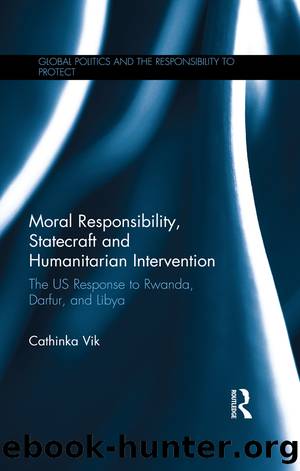Moral Responsibility, Statecraft and Humanitarian Intervention: The US Response to Rwanda, Darfur, and Libya by Cathinka Vik

Author:Cathinka Vik [Vik, Cathinka]
Language: eng
Format: epub
Tags: General, Africa, Peace, Political Science, History, Security (National & International), Human Rights
ISBN: 9780367599126
Google: zEneCQAAQBAJ
Goodreads: 53910256
Publisher: Routledge
Published: 2015-05-26T00:00:00+00:00
Darfur
We saw the helicopters bring the soldiers to our village. They killed many people â my father, two of my aunts, my sister, and all her little children.
(Survivor of the Darfur atrocities, cited in Wilson 2006)
Following the 1994 genocide in Rwanda, Power (2001: 104) concluded: âany failure to fully appreciate the genocide stemmed from political, moral, and imaginative weaknesses, not informational ones.â Skeptics hold that since 11 September 2001, the United States has even more clearly placed its own strategic interests ahead of concern for human rights, a view supported by the decline in Western contributions to peace operations since 2001. A more optimistic view suggests that intervention can be defensible on grounds of both human rights and national security if a state believes that vital security interests are at stake (Steele 2007). The experience in response to the atrocities in Darfur between 2003 and 2007 suggests not only that the Bush-declared âwar on terrorismâ fractured the fragile international consensus over humanitarian intervention, but also that the problem of political will bedeviled effective humanitarian intervention as it did over Rwanda.
Compelled by the pressure to âdo somethingâ or at least âsay somethingâ about Darfur on the 10-year anniversary of the Clinton administrationâs failure to acknowledge the reality in Rwanda, the Bush administration engaged in the rhetoric of genocide to appease constituencies. However, motivated by a pluralist understanding of the state as a moral actor, the president exploited the political climate at the time to avoid the expectation that the US would participate in military intervention. Despite daily reports on widespread atrocities and grave violations of human rights against the civilian populations in Darfur and the pairing of rhetorical commonplaces affording action, this case illustrates how the promotion of national interest dominated UN Security Council decision-making. Yet, despite the intent to act according to a pluralist understanding of the state as a moral actor, this relational constructivist analysis also reveals how the pairing of commonplaces such as âgenocideâ and âthe responsibility to protectâ with âthe national interestâ generated expectations of greater consistency in words and actions in future cases of severe human rights violations. The pluralistâsolidarist tension reflected in the US response to Darfur, therefore, eventually contributed to advancing an expanded notion of moral responsibility in international affairs.
Download
This site does not store any files on its server. We only index and link to content provided by other sites. Please contact the content providers to delete copyright contents if any and email us, we'll remove relevant links or contents immediately.
Goodbye Paradise(3798)
Men at Arms by Terry Pratchett(2832)
Tobruk by Peter Fitzsimons(2507)
Borders by unknow(2301)
Arabs by Eugene Rogan(2292)
Pirate Alley by Terry McKnight(2217)
Belonging by Unknown(1854)
More Than Words (Sweet Lady Kisses) by Helen West(1853)
It's Our Turn to Eat by Michela Wrong(1723)
The Biafra Story by Frederick Forsyth(1652)
The Source by James A. Michener(1602)
Botswana--Culture Smart! by Michael Main(1597)
Coffee: From Bean to Barista by Robert W. Thurston(1538)
A Winter in Arabia by Freya Stark(1534)
Gandhi by Ramachandra Guha(1528)
The Falls by Unknown(1520)
Livingstone by Tim Jeal(1482)
The Shield and The Sword by Ernle Bradford(1402)
Africa: Altered States, Ordinary Miracles by Richard Dowden(1381)
